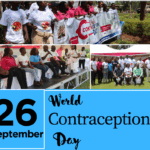
Advancing Rights at the Grassroots: Haki Mashinani Forums in Chavakali and Muhudu Wards
When communities gather with purpose around issues that affect them, change happens! May 7th, 2025 marked such a turning point in Vihiga County as we kicked off the second year of the Rights Activation Program for Sexual and Reproductive Health and Rights (RAP4SRHR). Supported by UNDP Kenya and the Embassy of the Kingdom of the Netherlands, this program aims to enhance the SRHR rights and entitlements of women and girls in Western Kenya.

We facilitated the convening of two vibrant Haki Mashinani forums on May 7th, 2025, in Chavakali and Muhudu wards of Vihiga County. The forums marked a critical step in activating grassroots accountability mechanisms around GBV prevention and mitigation while providing an opportunity to review progress made through the forums through a standardized format of action planning and tracking of emerging issues, gaps and formulation of recommendations to enhance protection of Sexual and Reproductive Health and Rights(SRHR) and Gender-Based Violence (GBV) rights. In both forums, local stakeholders, including police officers, Ministry of Health representatives, chiefs, children’s department officers, youth, teachers, religious leaders and community representatives, came together to reflect on progress made on implementation of the action plans and chart a way forward in addressing gaps and formulating recommendations.

A key highlight of the forums was the dissemination and sensitization on the effective use of the community reporting and tracking tool developed by Access to Medicines Platform and that provided a methodology for tracking progress, follow up, identifying of gaps and action planning. While Muhudu ward had already piloted the tool and shared a report, the Chavakali alliance was supported to initiate its application. Participants acknowledged the tool’s potential to guide planning, track progress, monitor success, and gather evidence for advocacy.
The forums uncovered recurring and urgent challenges in SRHR and GBV response:
- Rising cases of child neglect and abuse, often linked to absent or detained parents.
- Collusion between victims’ families and perpetrators to settle GBV cases privately.
- Suspects evading arrest and release on compromised police bonds.
- Low public awareness on the correct procedures for reporting and referral.
- High involvement of bodaboda riders in GBV incidents.
- Unreported GBV cases linked to the August circumcision rites in the Tiriki sub-tribe.
- Condom stock-outs in public health facilities, worsening the ‘triple threat’ of HIV, teenage pregnancies, and GBV.

“The county is witnessing a disturbing rise in defilement and rape cases in the county, with many of the perpetrators being close relatives—fathers, uncles, even grandfathers. It’s deeply troubling. As a community, we must stop shielding offenders through informal settlements and instead allow justice to take its full course. The law is clear, and these cases must be handled through the appropriate legal channels to protect survivors and deter future violations.”
— Dorothy Juma, during a media interview on GBV response in Vihiga County
Despite the sobering challenges, there were inspiring testimonies of progress:
- In Muhudu, community members celebrated how regular village barazas had led to increased reporting of GBV cases.
- Teachers from both wards noted that school outreaches by health workers were helping demystify SRHR and empowering girls to speak up.
Police representatives acknowledged that community pressure has led to follow-up on cases that would have otherwise disappeared into silence. - There has been a significant reduction in GBV cases, especially where local alliances are active and vocal.
Increased screening and treatment for HIV is happening at health facilities, driven by community referrals and awareness. - Most importantly, we’re seeing concerted community action and open dialogue on SGBV prevention—a shift from silence to sustained conversations.
The forums also served as a platform for proposing transformative solutions, including:
- Strengthening economic empowerment programs for teen mothers and out-of-school youth.
- Establishing safe houses and temporary holding spaces for GBV survivors.
- Promoting the 116 GBV reporting hotline.
- Enhancing psychosocial support and age-appropriate Comprehensive Sexuality Education (CSE) in Junior Secondary Schools.
- Organizing a teen mentorship summit to coincide with August circumcision ceremonies.
- Regulating and sensitizing bodaboda riders through their associations.
- Continued mentorship for alliance members on effective reporting, defining success indicators, and evidence-based advocacy.

“We need to urgently address what’s happening among Junior Secondary School students. We are now seeing defilement cases involving children as young as 6 to 8 years, with perpetrators sometimes being fellow minors aged 15 or 16. It is deeply concerning and highlights a growing crisis that calls for immediate intervention—through Comprehensive Sexuality Education, parental involvement, and stronger school-community partnerships. These are not isolated incidents; they reflect a larger breakdown in protection and guidance for our children.” — Ms. Emily Mageto, Children’s Officer, Chavakali
These proposals will feed into a broader call-to-action document targeting policy and decision-makers at county and national levels as part of our evidence based advocacy strategy.
Looking Ahead
The Haki Mashinani forums are well-positioned to deepen community-led accountability, spotlight local gaps, and influence real change in the fight against violence in all its forms while shaping policy with lived realities. Through strong ownership and growing capacity, alliance members are now better equipped to monitor implementation, document change, and advocate for lasting impact at the lowest administrative level. As we enter the second year of the Rights Activation Program, our focus remains clear: to empower grassroots actors as champions of SRHR, while leveraging on this mandate for policy change and implementing that will—ensure the rights of women and girls in Vihiga and beyond are not only recognized, but realized.
We acknowledge the continued support of UNDP Kenya and Embassy of Kingdom of Netherlands in making this work possible.



